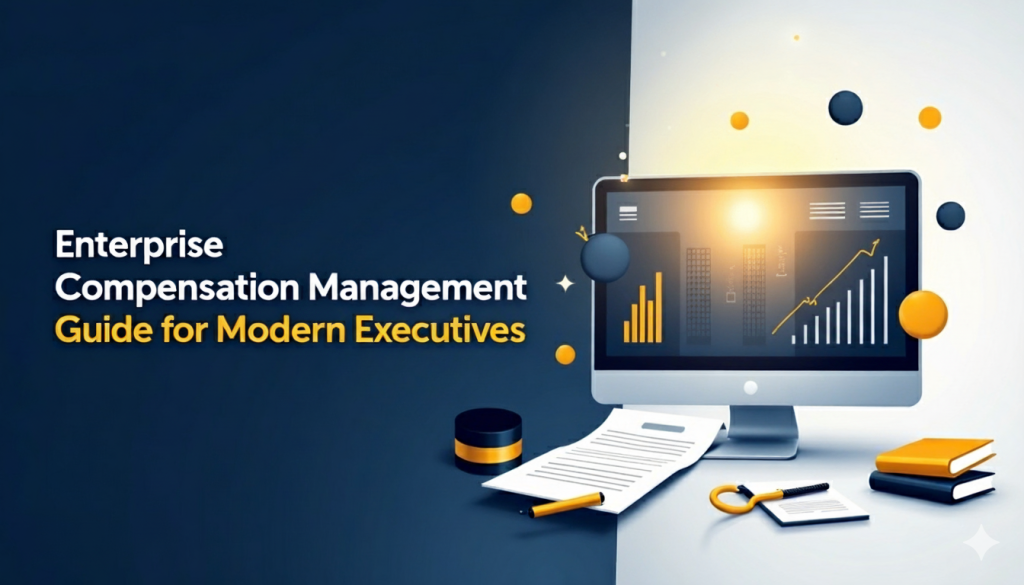Concerns about enterprise compensation management can erode trust. If our team doesn’t trust our compensation system, they will not say it out loud or complain in meetings. But they talk to each other. When they find a company paying better than ours, they leave.
But the question is, how can we, as leaders, make compensation work for our company, not against it?
In this guide, we will explore the enterprise compensation management strategy that all modern executives must know and implement as soon as possible, before our top talent walks to our competitors.
Table of Contents
What Is Enterprise Compensation Management?
Let’s break it down first….
Enterprise compensation management is the process or strategy that helps organizations plan, manage, and control employee compensation across the entire enterprise. It’s not just about paying people, it’s about paying them right.
At its core, enterprise compensation management ensures that:
- Compensation plans are closely tied to performance and business objectives.
- Pay structures are fair and competitive in the market.
- Every pay decision is data-driven, transparent, and consistent.
In simple words, enterprise compensation management turns compensation from a basic payroll function into a strategic advantage.
Why a Good Pay Strategy Matters
People don’t leave jobs only because of money.
A study by Willis Towers Watson found that 44% of executives leave their jobs because they feel undervalued or ignored, not just underpaid.
So our pay plan should be a silent message to our team. It tells them:
“You matter here,” or “You’re not just an employee.”
When our pay system feels unfair or unclear, our people lose trust in it. And when trust goes, so does our talent.

The Hidden Risk of Weak Enterprise Compensation Management
As mentioned above, the weak compensation isn’t just about losing money; it’s about losing trust. When employees feel their pay doesn’t match their effort, they stop giving their best. And soon, they start looking for new opportunities.
Without Enterprise Compensation Management, companies face problems like:
- Pay gaps between similar roles.
- Confusing bonus plans.
- Unclear promotion raises.
These issues slowly break trust and push people away.
Let’s look at how weak compensation impacts different parts of our business:
| Area | Impact of Weak Compensation | How ECM Helps |
|---|---|---|
| Employee Retention | When pay feels unfair, great people leave. | ECM creates fair, competitive pay plans that keep top talent. |
| Team Morale | ECM creates fair and competitive pay plans that retain top talent. | ECM boosts trust and motivation by making pay transparent. |
| Productivity | Disengaged teams perform below their potential. | ECM links pay to performance, encouraging accountability. |
| Company Reputation | Stories about unfair pay quickly damage your brand. | ECM keeps compensation aligned with your company’s values and image. |
| Financial Planning | Inaccurate pay data leads to wasted budgets. | ECM provides clear insights for smarter, balanced decisions. |
Weak compensation doesn’t just affect your payroll; it touches every corner of your organization.
The longer it goes unchecked, the more damage it causes. However, with a clear strategy, you can prevent this from happening and protect both your people and profits.
Retention Strategy: How to Keep the Talent That Drives Your Growth
Replacing people is expensive. Losing them slows projects and hurts morale. So how do we make them stay? The answer is clear: through smart, fair, and transparent enterprise compensation management.
Let’s make it simple:
- Pay fairly. When base pay matches the market, employees feel respected.
- Reward results. Add bonuses or performance pay that says, “We see your effort.”
- Be transparent. When employees understand how pay decisions are made, trust grows and turnover drops.
And that brings us to the next big idea, how to turn that loyalty into return on investment (ROI).
ROI: Getting More from Every Dollar You Pay
Every company spends a significant amount on payroll. But not every company gets the same results from it.
That’s where ROI (Return on Investment ) comes in. It’s about ensuring that every penny you spend on your people yields something valuable in return.
Here’s how to design an enterprise compensation management system that gives real results.
- Be clear about what you reward. When people know what matters, they focus on it.
- Use facts, not feelings. With enterprise compensation management (ECM) tools, you can track what’s working and fix what’s not.
- Link pay to purpose. When your goals and pay plan work together, everyone moves in the same direction.
When our compensation system aligns with our mission, every dollar we spend yields loyalty, effort, and long-term success.
Build an Enterprise Compensation Management System (That Actually Works)
Now here’s the challenge. Understanding why compensation matters is one part. Actually building a system that works is another. And it’s easier than you think. Here’s the step-by-step guide to follow:
- Step 1: Align pay with goals: What does your company need the most this time: growth, retention, or innovation? Set your pay plan accordingly.
- Step 2: Establish a clear structure: Defining salary bands, bonus rules, and transparent promotion paths. That consistency keeps things fair.
- Step 3: Be transparent: Let your workers see how their pay is connected to performance and the company’s success. It builds trust.
- Step 4: Go digital: Stop relying on messy spreadsheets. Use modern compensation tools to track, plan, and manage pay globally.
- Step 5: Review frequently: Markets are constantly shifting. People’s needs change with time. Review and tweak your pay plans regularly.

Connecting the Dots: Risk, Retention, and ROI
Let’s pull everything together.
- We can reduce risk when our pay is fair, legal, and consistent.
- We can increase retention when employees feel valued and see a future with us.
- ROI increases when compensation fuels the business, rather than draining it.
As executives, our job is to ensure that every dollar we spend works for us, not as a cost, but as a lever for growth.
Ask yourself these questions:
- “If we increase pay in key areas, how much will turnover drop?”
- “If bonuses reflect performance, will productivity rise?”
- “If pay is transparent, will people trust leadership more?”
When you start thinking this way, you’re no longer just managing salaries; you’re managing strategy.
Conclusion
At the end of the day, our people are our most significant investment, and enterprise compensation management is how we protect and grow that investment.
Fair pay builds trust. Smart pay builds loyalty. Together, they create enduring success.
Businesses that succeed today are those that pay strategically. To make every pay decision matter, remember these three points.
- Is it helping us keep great people?
- Is it rewarding the right work?
- Are our payments aligned with where our business is headed?
If not, now’s the time to fix it. Because when you get enterprise compensation management right, everything else, like performance, culture, and growth, starts to fall into the right place.
That’s what enterprise compensation management does: It doesn’t just manage pay; it can help us build a company people want to work for.
FAQs
Not necessarily at first, but yes, software and tools are used in modern ECM to track pay, manage data, maintain fairness, and streamline processes.
A company of any size can benefit from ECM, but it is especially helpful for complex or rapidly expanding businesses.
Viewing compensation as an expense. or choosing at random without information or equity. ECM means considering compensation as an investment.
Most ECM tools include pay planning dashboards, performance tracking, bonus allocation, budgeting, compliance checks, and real-time analytics.
Absolutely. You don’t need to be a giant enterprise. ECM works for any company that wants to manage pay strategically, rather than manually.
No. Payroll is about processing payments; ECM is about planning how much to pay and why. Payroll executes, ECM decides the strategy.











